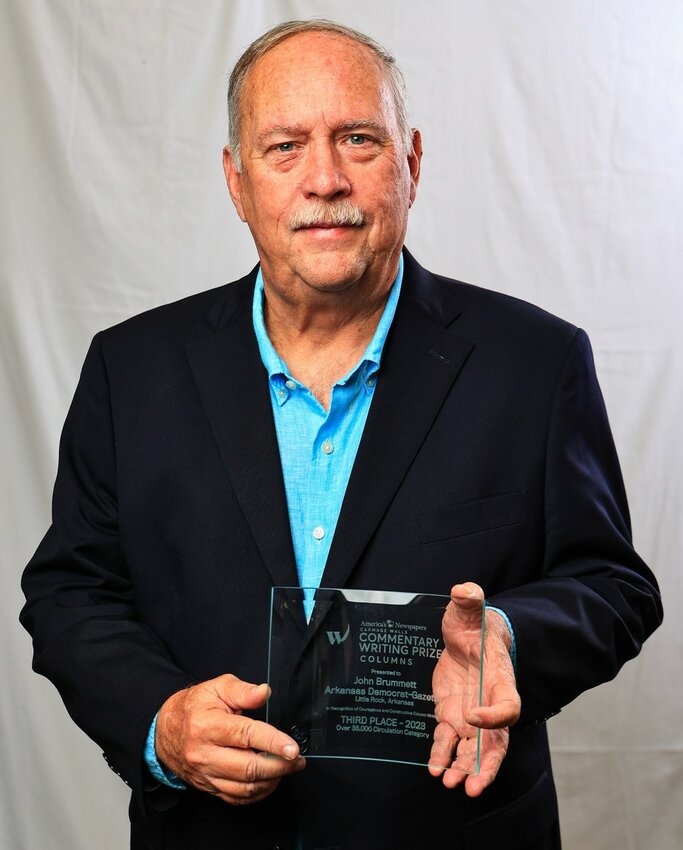First Place
Bridget Grumet
Austin American-Statesman
Austin, Texas
Austin American-Statesman Metro columnist Bridget Grumet confronted "the most formidable force in our community — law enforcement — in a trio of columns that challenged police narratives and revealed efforts to dodge accountability," Editor Manny Garcia said in submitting her work for the Carmage Walls Commentary Prize.
He said: "In two cases, Bridget obtained exclusive video footage that raised central questions about officers’ use of force. (Both videos appeared with the online versions of the columns.) Austin police came under scrutiny last November for fatally shooting tech entrepreneur Rajan Moonesinghe outside his home, after he fired his gun at what he believed was an intruder. Reporting with rigor and empathy, Bridget revealed a deeper tragedy than readers knew: She obtained 911 recordings showing the police dispatcher failed to tell the arriving officer that Moonesinghe lived in the house and was not a burglar. The officer opened fire with scant warning. She obtained front porch Ring camera footage that showed officers kept the grievously wounded homeowner in handcuffs as he bled to death, a shocking practice that still demands an answer from police.
"A few months later, state troopers took the unprecedented step of expelling dozens of LGBTQ+ demonstrators from the Texas Capitol in Austin — a show of force that traumatized a community being targeted by new legislation. Texans expected that troopers had good reason for any arrests they made, but Bridget’s reporting showed the opposite: A judge had promptly tossed the charges against one protester, and cell phone video footage obtained by Bridget showed a second protester had been cited for nothing more than accidentally bumping a trooper with a baseball cap.
"Accountability is impossible without transparency. As the issue of civilian police oversight landed on the city ballot this spring, Bridget spotlighted the underhanded tactics by the well-funded Austin police union to sandbag voters. Bridget’s coverage not only helped voters sort out the confusion over two ballot measures with the same name, but she called out the police union’s effort to advance a law that would bypass Austin voters altogether. (That bill died in the final days of the legislative session.)
"In Austin, our law enforcement officers have vast powers to use deadly force, make arrests and establish a narrative (whether true or not) through official reports. The watchdog for the public is the press."
Judges said:
Read her columns:


Second Place
Brier Dudley
The Seattle Times
Seattle, Washington
Brier Dudley's weekly columns (supplemented with a newsletter and dedicated website) raise awareness of America's local journalism crisis, explain challenges facing the industry and advocate for solutions and policy responses.
During 2022 and early 2023, his columns urged Washington's Legislature to help save the local press. They proposed a reporting fellowship and urged action on a tax break for local newspaper publishers.
He said Washington's Legislature funded the civic reporting fellowship program, to place graduating journalism students in local outlets, and the tax break estimated to save local publishers at least $10 million over the next decade.
The columns are made available for free to the public and to other newspapers for their use. The entire body of work is viewable here: st.news/SavetheFreePress
Judges said his columns were well-written and courageous — with a lot of local elements.
They also said:
Read his columns:


Third Place
John Brummett
Arkansas Democract-Gazette
Little Rock
David Barham, editorial page editor of the Arkansas Democrat-Gazette, says John Brummett is "one of the lions of Arkansas journalism, and one of a dwindling breed at that. He’s a fierce liberal who doesn’t mind being one in this reddest of red states — and folks here demand his column. (It’s said one of the greetings in Arkansas among friends is: 'Have you read Brummett this morning?')"
Judges said:
Read his columns:

The judges in this bracket also recognized two additional finalists:
Finalist
Bridget Grumet
Austin American-Statesman
Austin, Texas
A second set of columns by Bridget Grumet also was recognized as a finalist this year.
Editor Manny Garcia said Grumet has long held Texas Attorney General Ken Paxton to account, well before the state House impeached him in May.
He said, "With dogged reporting and smart prose, Bridget has continued to show how Paxton used his power to advance an agenda at odds with Texans’ interests."
Garcia said: "While other news outlets dashed off stories last fall from a press release about an Austin woman denied medical care under Texas’ new abortion bans, Bridget sat down with Amanda Zurawski, who shared in intimate detail the trauma of her ordeal — one that any pregnant woman could face in Texas. Then Bridget showed how Zurawski’s suffering was the inevitable result of Paxton using the courts to block care for women in cases like hers, all while the governor acknowledged problems with the laws but did nothing to fix them.
"Bridget also continued her long-running scrutiny of Paxton’s efforts to interfere with those who run our elections. Hours before VoteBeat broke the story about Paxton issuing an advisory opinion on public access to ballot records, Bridget learned elections officials were already getting inundated with requests for this data. Bridget traced the chatter about this advisory opinion on right-wing social media and helped readers understand how Paxton had just propped open a door for anyone who wants to wreak havoc in an upcoming election.
"Paxton’s longest-running scandal — the fact that he remains under criminal indictment while serving as Texas’ top cop — has dragged on for so long that many Texans have become inured to the controversy. As the case reached another milestone with no end in sight, Bridget cut through the doubletalk, plainly explained the delays and showed how far removed this case has become from the judicial system for the rest of us. Implicit in every column is a question to readers: Are you OK with this?
"In fair-minded commentaries devoid of cheap shots, Bridget showed how the state attorney general championed his own interests ahead of those of Texans."
Judges scored this entry very highly. They said the columns were excellently sourced with clear writing and persuasive conclusions. They said the columns explain complex situations in ways that help the reader understand the gravity of what is happening in Texas. They said it contained strong reporting and opinion writing in a very clear and concise style.
Read her columns:


Finalist
David Plazas
The Tennessean
Nashville, Tennessee
David Plazas has written on Tennessee politics since he arrived in the state capital, Nashville, in 2014. He has developed deep sources and expertise on matters of City Hall, the state legislature and the Tennessee congressional delegation. The submissions in his entry reflect that breadth of knowledge, clarity in writing and depth in argument.
The first column ("Footloose" in Tennessee) addressed the proposal to prohibit drag shows from public places as part of the ongoing effort to marginalize LGBTQ citizens, which had been occurring for years. Plazas argued that drag shows and places of worship could co-exist. While the legislature adopted the bill and the governor signed it into law, the courts have sided against the state to date.
The second column focused on the arduous election of Rep. Kevin McCarthy as Speaker of the U.S. House of Representatives. Eight of Tennessee's nine members of Congress backed McCarthy, but newly elected Rep. Andy Ogles, decided he would not support the would-be Speaker at first. This was an analysis of a dangerous game that Ogles played to try to appease his base and stay in McCarthy's good graces, but it's a game that could blow up in his face.
The final selection relates to the Tennessee General Assembly's ongoing feud with the Nashville city government sparked by the latter's rejection of the 2024 Republican National Convention. Lawmakers decided to retaliate by shrinking the size of local government and messing with the city's finances. Plazas argued that this was an afront to the spirit and letter of the state Constitution granting power to the people. A lawsuit was led by the city to stop the government shrinkage and a judge sided with Nashville for the time being.
Judges said:
Read his columns:


First Place
Dion Lefler
The Wichita Eagle
Wichita, Kansas
This entry included three columns:
1. Hospital raid busts dying man for pot extract:
Impact: Several days after the column ran, Hays Police and the local prosecutor announced they had dropped criminal charges against the man who was the subject of the hospital-room raid. They said they planned to do so before the story ran. There's no documented evidence showing whether that's true, or whether they back-pedaled in reaction to the widespread national attention that the column drew.
What is certain is they did not inform the hospitalized man before the column ran, and he spent his last Christmas believing he was facing a criminal drug charge on his deathbed. He died three weeks later.
The story was cited by the governor in her State of the State address to the Legislature as she called for decriminalization of medical marijuana: “This is not to blame the police — the police were just enforcing the law,” she said. “That means the law itself is ridiculous.”
A bill to legalize medical marijuana has previously passed the state House of Representatives, but was blocked in a Senate committee this year. The struggle continues.
2. Public parks, private profits:
Impact: It did cause city officials to take a serious look at privatization proposals involving public parks.
Since the column ran, the City Council decided that a planned $6 million pickleball complex — originally proposed to be run by private management — will instead be operated by the Parks and Recreation Department and managed by city employees who run the city's tennis center.
3. Busting gun myths that surface after mass shootings:
This was a highly controversial article in a state where gun culture runs deep, and anyone who can legally own a firearm can legally carry it, openly or concealed, without permit or training.
The column did spark a lot of discussion and led many Kansans to question the underlying philosophy behind our gun laws, that more guns in more hands in more places equals more safety for the public.
It has not moved forward any changes in state law, which is essentially impossible given the pro-gun, pro-NRA dominance of our Legislature.
However, lawmakers did fail — by a single vote — to override a governor's veto of a bill that would have required Kansas elementary schools to buy and use an NRA-created program when teaching about gun safety.
Judges said:
Read his columns:
This link includes the three columns listed below


Second Place
Lizi Arbogast Gwin
The Alexander City Outlook
Alexander City, Alabama
As the editor of a small community newspaper, I really try to use my column as a platform to reach people on their level. I like to discuss the difficult issues, especially regarding mental health and how trauma affects our lives. Recently, our community has dealt with a series of hardships and I wanted to really address those issues head on. The feedback was very positive.
Judges said:
Entry includes 3 columns:

Third Place
Jess Huff
The Lufkin Daily News
Lufkin, Texas
Staff writer Jess Huff started 2022 with the intention of documenting sexual assault cases in Angelina County. She took an in-depth look at the issue in this county and found that while sexual assault is a common crime, it’s one that often goes unreported.
Her columns discuss both the heartbreak and horror of what she found: crimes are most commonly committed by people the victims know, prosecution is difficult and even a guilty verdict is no guarantee that criminals won’t continue to commit violence. A column about animal abuse in this community said the situation is no less horrific.
Judges said:
Read her columns:

Judges in this bracket also named two additional finalists:
Finalist
Karl Richter
Texarkana Gazette
Texarkana, Texas
On his entry form, Karl Richter, a columnist with the Texarkana Gazette, said that the "school choice" voucher scheme in Arkansas Gov. Sarah Huckabee Sanders' signature education reform bill forces taxpayers to fund religious indoctrination and discrimination. He said, "It passed, but I'm unaware of anyone else who even raised this issue."
Judges said this entry presented a clear, well researched and stated position on his state’s new education funding policies. One judge commented, "I was impressed by how he takes on the governor and calls her and others out for biased law making, but does so without calling names or overtly insulting anyone."
Read his column:

Finalist
Gary Stallard
The Lufkin Daily News
Lufkin, Texas
Jeff Pownall, managing editor of The Lufkin Daily News, said the three columns that he entered into the contest on behalf of Gary Stallard "combine a strong blend of original thought, original reporting and interviewing, and good writing in an attempt to reach an audience that may not be inclined to hear what he has to say."
He said, "It would be easy to avoid such difficult topics as his own struggles with mental health, such unpopular local issues as common sense gun laws and such uncomfortable subjects as our community’s attitudes during the integration of our public schools in 1971. It would be far easier to avoid such difficult issues, yet Gary doesn’t, and that’s admirable in this day and age. These columns are thorough, thoughtful, compassionate and thought-provoking — and our community benefits from the courage and conviction of his writing."
Judges were impressed with his entry, noting that Stallard took on local issues, as in the case of the school integration column. His willingness to put his own mental health struggles on display were significant, as well.
Read his columns: